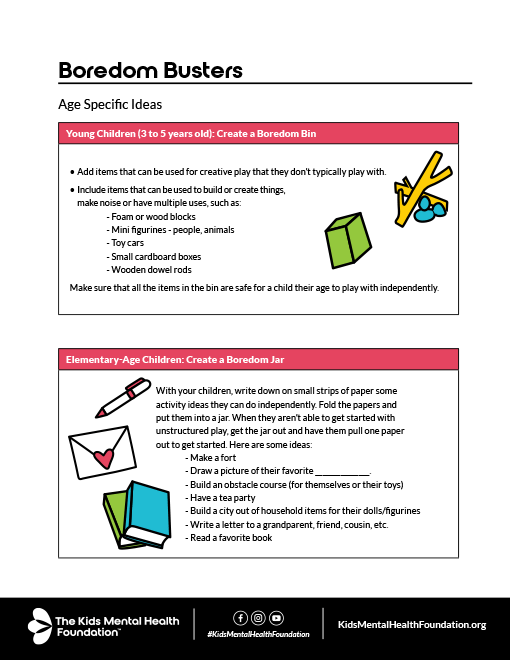-
Acknowledge and Discuss Differences: When children notice developmental differences, engage in open conversations that highlight both similarities and differences, fostering empathy and understanding.
-
Encourage Inclusive Interactions: Support your child in forming relationships with peers of diverse abilities to promote acceptance and reduce biases.
The Good and Bad of Boredom
Article Summary
- Boredom challenges children to come up with their own solutions and engage in creative play, which is beneficial for their mental health.
- Having time without planned activities allows children to explore and entertain themselves, fostering independence.
- Allowing children to experience boredom helps them learn to manage frustration and develop resilience.
You’ve probably heard a child, sitting among various toys, activities and games announce "I'm boooooored!" While some caregivers feel pressured to prevent boredom in their children, allowing children to feel bored sometimes can actually be good for their mental health.
What Is Boredom?
While it’s good for our minds to be active most of the time while we’re awake, our brains can get used to having constant stimulation. So when that expected activity stops, the brain tells us “I’m bored!”.
Boredom is a result of our brains not having something to focus on (like an activity or school). Depending on the age of your children, they may demand a quick fix to this feeling by asking for someone to entertain them or turning to a screen.
But most screen time activities are just a distraction and may only delay those feelings of boredom.
How Boredom Can Be an Opportunity
During times of boredom, when no one offers an easy solution, the brain is challenged to fix the problem. This makes children more likely to come up with their own solutions. This can also encourage kids to be creative. Problem solving and creativity are both good for kids’ mental health.
Getting Started
- Schedule unstructured time into the day. Insert some time without any planned activities into your child’s day so you can guide them toward playing creatively.
- You can have certain items easily accessible, for example mismatched art supplies or building materials to steer them in the right direction.
- You can also encourage them to spend time outside during this time!
- Be ready to tolerate some frustration. Most kids want someone to provide an activity for them, not realizing that creative play is often more engaging and satisfying. If they complain about being bored, teach them that this is their brain wanting to be more active and encourage them to come up with an idea themselves!
- Let them make a mess. Within reason, allow them to make a mess and then get them to help clean up afterward. It's worth it to have their brains active and engaged.
- Praise them. If you find them engaged in something new or different, let them know how proud you are of them. When they are done playing, ask them to describe how they came up with the idea or what they were doing. Let them know their imagination and creative play is something you value.
Need more ideas? Download age-specific suggestions below.
When to Be Concerned About Boredom
While letting kids feel bored for a short period of time is great for creativity and problem solving, we don’t want children to be bored or have low activity for long periods of time. We know that engaging in fun and pleasant activities is important to decreasing the risk for things like depression and anxiety.
If a child in your life rarely seems interested in the world around them, or seems bored when others around them are active (like during a sport or class activity), take the time to ask them about how they’re feeling. If the problem continues over time, you may want to talk with their teacher, school counselor or pediatrician.
Boredom doesn’t have to be scary, for you or for the children in your life. Allowing kids to be a little bit bored occasionally can help them develop problem-solving skills, learn to entertain themselves and help foster creativity – and that’s good for their mental health.
Download our Boredom Busters!
Research References
Sheshardi A. Boost Your Brain With Boredom. Mayo Clinic Health System. September 14, 2022. Accessed May 3, 2023. https://www.mayoclinichealthsystem.org/hometown-health/speaking-of-health/boost-your-brain-with-boredom
Schwartze M. Frenzel A. Goetz T. Pekrun R. Reck C. Marx A. Fiedler D. Boredom Makes Me Sick: Adolescents’ Boredom Trajectories and Their Health-Related Quality of Life. International Journal of Environmental Research and Public Health. 2021 Jun; 18(12):6308.
 Copy Link
Copy Link




